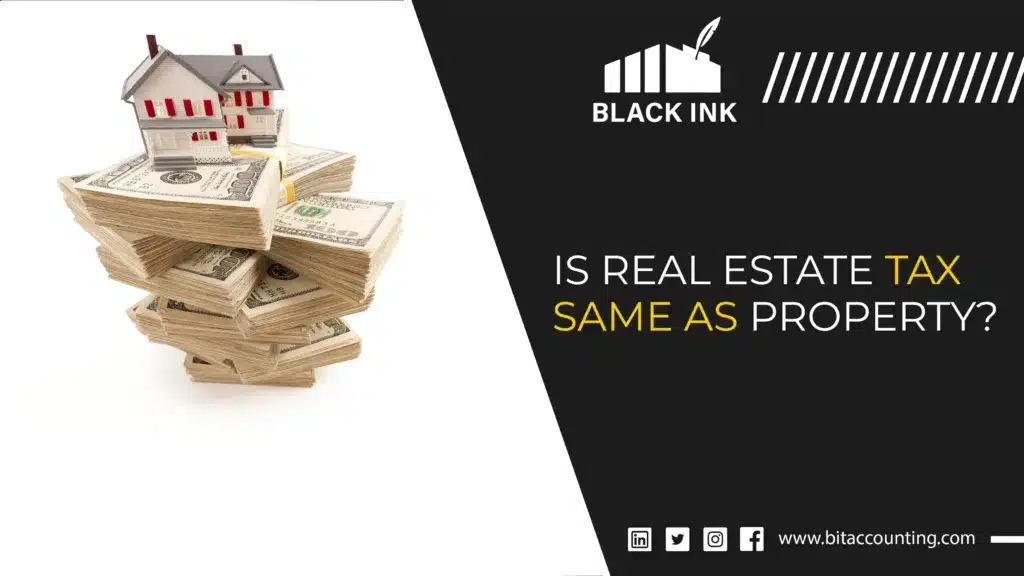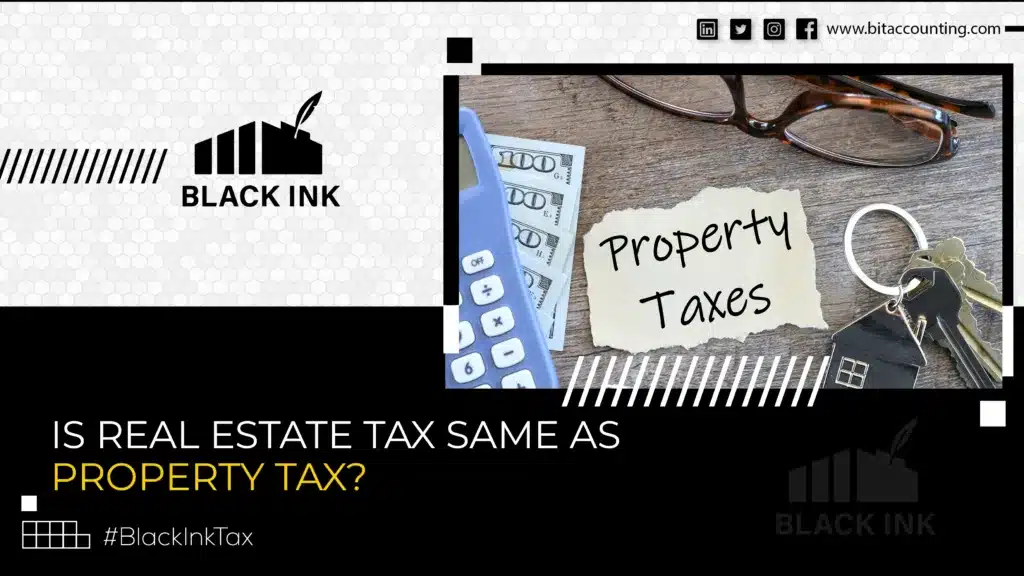
Table of Contents
Are Real Estate Taxes the Same as Property Taxes?
Already own a property? Or thinking of buying one? Don’t worry we are not gonna sell you a house or property instead we are gonna tell you how do taxes get applied to your personal property and in doing so, one question must have crossed your mind at least once: Are real estate taxes the same as property taxes? And being really honest it’s a fair question especially because these terms are often used together or in the same sense, making you question valid. But in reality, they are not that much similar, and knowing their difference can save you some unexpected money, and make sure to avoid any sort of legal difficulties by the IRS.
But no need to break a sweat over this, we are here to give you a complete guide and overview about this question and tell you more about real estate taxes and property taxes.
What Are Real Estate Taxes?
So, the very first question, what exactly are real estate taxes? These are the taxes that are applied on immovable property that means properties like Land or any thing that comes with that specific land like buildings and houses. These taxes are collected by non-other than the local governments, such the counties and townships, and they are responsible for the funding of public service, like maintaining the roads and bridges.
When the term real estate tax is mentioned, people are often referring to property tax but there are some differences which we are gonna discuss later. The term real estate emphasizes the nature of the property: it’s real, physical, and fixed in place.
How Real Estate Taxes Are Calculated
Its not that hard but always remember these taxes are calculated based on two factors:
- Assessed Value of the Property
This is the value assigned to your property by a government assessor. It may not match the market value but is used solely for tax purposes. - Local Tax Rate (Millage Rate)
Often expressed in “mills” (1 mill = $1 per $1,000 of assessed value), the local rate determines how much you pay based on your property’s value.
If your home is assessed at $250,000 and your local millage rate is 20 mills (or 2%), your annual real estate tax would be:
$250,000 × 0.02 = $5,000
What Are Property Taxes?
Now it’s the turn for the other part of the equation, what are property taxes? Basically, these are the taxes imposed upon both real properties like buildings and land, and on personal properties like vehicles, boats, or any sort of business equipment.
So, to answer the main question again: Are real estate taxes the same as property taxes? In many cases, yes — especially when referring to real property. But property tax is technically the broader term, encompassing both real estate and personal property taxes.
What Do These Taxes Cover?
Property taxes are the lifeline of local government so its important to know what your taxes are actually covering or you can what they should be covering.
Public Schools and Education
A significant portion of your property tax goes toward funding local school districts, including teacher salaries, school maintenance, and educational programs.
Local Emergency Services
Fire departments, police departments, and ambulance services are often funded directly through property taxes.
Road Maintenance and Infrastructure
Your tax dollars contribute to maintaining roads, bridges, and sidewalks in your community.
Public Parks and Recreation
Local parks, community centers, and recreational programs are supported through property tax revenues.
Community Services
This includes libraries, waste management, street lighting, and other services that maintain public wellbeing.
How Property Taxes Are Calculated
Like real estate taxes, property tax calculations are based on:
- Assessed Value of Property
Evaluated periodically by a local tax assessor. - Applicable Tax Rate
This varies by city, county, and even school district.
Property Tax Rates in Different States of the U.S.
Property tax rate varies from state to state, some maybe higher than you think:
| State | Property Tax Rate |
| Hawaii | 0.27% |
| Alabama | 0.39% |
| Colorado | 0.49% |
| Nevada | 0.50% |
| Louisiana | 0.55% |
| South Carolina | 0.56% |
| District of Columbia | 0.57% |
| Delaware | 0.57% |
| West Virginia | 0.58% |
| Wyoming | 0.58% |
| Arkansas | 0.61% |
| Utah | 0.63% |
| New Mexico | 0.65% |
| Mississippi | 0.65% |
| Tennessee | 0.66% |
| Idaho | 0.69% |
| Arizona | 0.72% |
| Missouri | 0.73% |
| Montana | 0.74% |
| California | 0.76% |
| Indiana | 0.76% |
| Kentucky | 0.78% |
| Florida | 0.83% |
| North Carolina | 0.84% |
| Virginia | 0.85% |
| Oregon | 0.90% |
| Washington | 0.93% |
| Georgia | 0.94% |
| Oklahoma | 0.97% |
| Alaska | 1.02% |
| North Dakota | 1.05% |
| Minnesota | 1.08% |
| Pennsylvania | 1.09% |
| Texas | 1.10% |
| Kansas | 1.14% |
| Michigan | 1.31% |
| Nebraska | 1.36% |
| Wisconsin | 1.53% |
| Ohio | 1.56% |
| Iowa | 1.57% |
| Massachusetts | 1.63% |
| Rhode Island | 1.63% |
| Vermont | 1.76% |
| Connecticut | 1.79% |
| New Hampshire | 1.93% |
| Illinois | 2.08% |
| New Jersey | 2.23% |

Personal Property Tax vs. Real Estate Tax
So, the main question has been answered, and you can read this chart for a quick summary what’s the main difference.
Feature | Real Estate Tax | Personal Property Tax |
What It Taxes | Land and permanent structures | Moveable items (e.g., vehicles, machinery) |
Assessed By | Local or county governments | Often state or county agencies |
Paid By | Homeowners and landowners | Individuals and businesses |
Tax Frequency | Usually annual | Annual, but varies by item and state |
States Where Applicable | All 50 states | Select states only |
Common Misconceptions
It’s kinda impossible to deal with taxes, without having any sort of misconceptions, lets clear them up, shall we?
- Misconception 1: “Property tax only applies to real estate.”
Truth: Property tax can include personal property depending on your state. - Misconception 2: “I don’t need to pay property tax if I own my home outright.”
Truth: You still owe property taxes even if your mortgage is fully paid. - Misconception 3: “Tax rates don’t change.”
Truth: Rates and assessed values can increase annually, depending on local budgets.
When Should You Consider An Appeal?
If you realized or believe that your property tax assessment is too high than usual, then you should certainly apply for an appeal.
- Check your assessment notice
- Compare with similar properties
- File a formal appeal with your local assessor’s office
- Consider hiring an independent appraiser or tax consultant
Appealing can reduce your bills, that if they were wrong in the first place.
Getting Help From a Professional
Dealing with taxes isn’t really a piece of cake, if you are confused or have no idea then you should never try to do it on your own without any knowledge, always consider a Tax Specialist, they can help you with your confusion and in some cases even save your money, you can visit BitAccounting for more professional advice and help.
They can help you navigate tax obligations, identify deductions, and even challenge over-assessments.
Last Verdict
So, are real estate taxes the same as property taxes? Mostly, yes – particularly when we are dealing with homes or land, but property tax also includes your liabilities like cars, boats, and business assets, this depends on your state.
Frequently Asked Questions (FAQs)
What state has the highest real estate tax?
New Jersey currently has the highest average effective real estate tax rate, at around 2.21%.What state has the cheapest real estate tax?
Hawaii boasts the lowest effective real estate tax rate, at just 0.28%.What is real property?
Real property includes land and anything permanently attached to it — such as houses, buildings, and other immovable structures.Do I still pay property tax if my mortgage is paid off?
Yes, property tax is independent of your mortgage status.Can I deduct property taxes on my federal return?
Yes, but the SALT deduction caps the amount you can deduct to $10,000 as of 2025.Is personal property tax the same everywhere?
No, only certain states assess personal property tax, and rates and rules vary widely.How do I find my property tax rate?
Check with your county tax assessor or look at your most recent property tax bill.Can property tax be appealed?
Yes, if you believe your assessed value is incorrect, you can file an appeal.Are property taxes paid monthly?
They’re usually billed annually or semi-annually, but escrow accounts can allow for monthly contributions.
GET FREE QUOTE FOR ALL OF OUR SERVICES
Black Ink will send you a free analysis of your current state and what would be the cost of managing either a separate accounting and bookkeeping services or a complete solution across New York, USA. Do get in touch and we will be happy to consult you with our bookkeeping services in NY, New York, USA.
